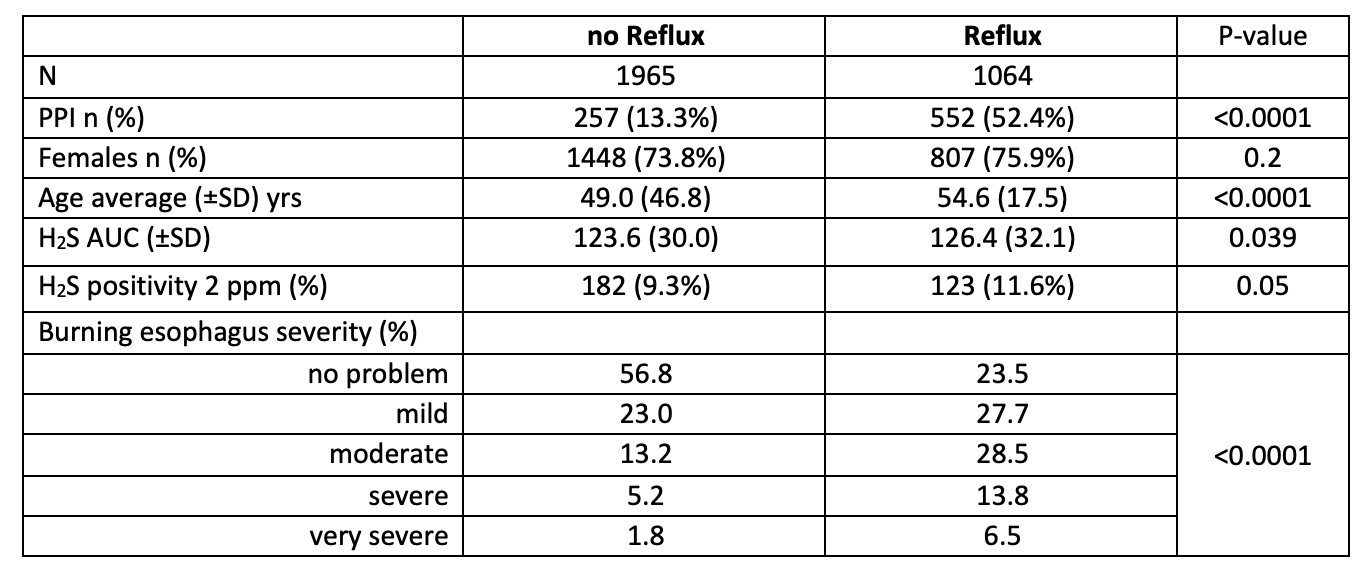Tuesday Poster Session
Category: Esophagus
P4929 - Hydrogen Sulfide Levels on Breath Testing Are Associated With GERD and Esophageal Symptoms, Independent of PPI Use
Tuesday, October 28, 2025
10:30 AM - 4:00 PM PDT
Location: Exhibit Hall

Gabriela Leite, PhD (she/her/hers)
Cedars-Sinai Medical Center
West Hollywood, CA
Presenting Author(s)
Gabriela Leite, PhD1, Amrit K. Kamboj, MD2, Ali Rezaie, MD, MSc2, Ruchi Mathur, MD1, Mohamad Rashid, MD2, Ava Hosseini, MPH1, Daniel Brimberry, PhD2, Matthew Mitcho, 3, Fabrice Wilfong, 3, David Richardson, MSc4, Mark Pimentel, MD, FACG2
1Cedars-Sinai Medical Center, West Hollywood, CA; 2Cedars-Sinai Medical Center, Los Angeles, CA; 3Gemelli Biotech, Raleigh, NC; 4Gemelli Biotech, Mesa, AZ
Introduction: Breath testing (BT) is used in the workup of patients with chronic gastrointestinal symptoms and measures hydrogen (H2), methane (CH4) and now, hydrogen sulfide (H2S). The relationship between breath test results and GERD is underexplored. Recently, we showed that GERD subjects have an increased levels of the H2S producer, Bilophila sp in the foregut. H2S can have detrimental effects on lower esophageal sphincter (LES) tone. In this study, we examine the relashionship between breath H2S among GERD and non-GERD in a nationwide study.
Methods: Consecutive subjects undergoing an in-home three gas BT were asked to complete a symptom questionnaire, medication intake (e.g., Proton Pump Inhibitors [PPI]), and if they ever were diagnosed with reflux. Subjects prepared for BT per the North American Consensus. After fasting, subjects provided an end-expiratory breath sample and then ingested lactulose (10g) or glucose (75g) at the discretion of the physician. Breath samples were collected in consecutive bags every 15 minutes for 2 hours. Bags were then compiled and processed using a specialized gas chromatography instrument that measured H2S at baseline and at each time point. H2S >2.0ppm was considered positive.
Results: Of 6000 subjects, 3029 (50.4%) completed a breath test and questionnaire (F=74.5%, age=50.3±18.1yrs). Of these, a total of 1064 subjects had GERD (Table 1) with an average age higher than subjects without reflux (54.6±17.5 yrs vs. 49.0±46.8 yrs, respectively) (P< 0.0001). As expected, more subjects with reflux were on PPI (P< 0.0001), and had more severe "burning esophagus" sensation than those without reflux (P< 0.0001). Subjects with reflux had significantly higher H2S AUC when compared to those without reflux (P=0.039), and this signal was still observed when reflux subjects not taking PPI were compared to subjects without reflux also not taking PPI (P=0.042). In addition, the symptom severity of the "burning esophagus" sensation correlated positively with H2S AUC (P=0.002). Subjects without reflux but taking PPI had higher H2S AUC when compared to subjects without reflux and not taking PPI (129.2±31.6 vs. 122.7±29.7, respectively) (P=0.001). As previously described, H2S correlated with diarrhea severity as well (P=0.003).
Discussion: This study demonstrates that elevated H2S levels on breath testing are associated with GERD with or without PPI use. In addition, H2S levels correlate with the severity of GERD symptoms as well as diarrhea.

Figure: Table 1. Subject’s demographics, H2S and GERD symptom severity profiles.
Disclosures:
Gabriela Leite indicated no relevant financial relationships.
Amrit Kamboj: Sanofi – Speakers Bureau.
Ali Rezaie: Ardelyx, Blueprint Medicine and Salix Pharmaceuticals – Consultant. Gemelli Biotech, and Good LFE – Equity stake.
Ruchi Mathur: Gemelli Biotech – Royalties, Stock-privately held company. goodLFE – Stock-privately held company.
Mohamad Rashid indicated no relevant financial relationships.
Ava Hosseini indicated no relevant financial relationships.
Daniel Brimberry indicated no relevant financial relationships.
Matthew Mitcho: Gemelli Biotech – Employee.
Fabrice Wilfong: Gemelli Biotech – Employee.
David Richardson indicated no relevant financial relationships.
Mark Pimentel: Ardelyx – Consultant. Gemelli Biotech – Advisory Committee/Board Member, Royalties, Stock-privately held company. GoodLFE – Stock-privately held company. Salvo Health, Cylinder Health – Stock Options.
Gabriela Leite, PhD1, Amrit K. Kamboj, MD2, Ali Rezaie, MD, MSc2, Ruchi Mathur, MD1, Mohamad Rashid, MD2, Ava Hosseini, MPH1, Daniel Brimberry, PhD2, Matthew Mitcho, 3, Fabrice Wilfong, 3, David Richardson, MSc4, Mark Pimentel, MD, FACG2. P4929 - Hydrogen Sulfide Levels on Breath Testing Are Associated With GERD and Esophageal Symptoms, Independent of PPI Use, ACG 2025 Annual Scientific Meeting Abstracts. Phoenix, AZ: American College of Gastroenterology.
1Cedars-Sinai Medical Center, West Hollywood, CA; 2Cedars-Sinai Medical Center, Los Angeles, CA; 3Gemelli Biotech, Raleigh, NC; 4Gemelli Biotech, Mesa, AZ
Introduction: Breath testing (BT) is used in the workup of patients with chronic gastrointestinal symptoms and measures hydrogen (H2), methane (CH4) and now, hydrogen sulfide (H2S). The relationship between breath test results and GERD is underexplored. Recently, we showed that GERD subjects have an increased levels of the H2S producer, Bilophila sp in the foregut. H2S can have detrimental effects on lower esophageal sphincter (LES) tone. In this study, we examine the relashionship between breath H2S among GERD and non-GERD in a nationwide study.
Methods: Consecutive subjects undergoing an in-home three gas BT were asked to complete a symptom questionnaire, medication intake (e.g., Proton Pump Inhibitors [PPI]), and if they ever were diagnosed with reflux. Subjects prepared for BT per the North American Consensus. After fasting, subjects provided an end-expiratory breath sample and then ingested lactulose (10g) or glucose (75g) at the discretion of the physician. Breath samples were collected in consecutive bags every 15 minutes for 2 hours. Bags were then compiled and processed using a specialized gas chromatography instrument that measured H2S at baseline and at each time point. H2S >2.0ppm was considered positive.
Results: Of 6000 subjects, 3029 (50.4%) completed a breath test and questionnaire (F=74.5%, age=50.3±18.1yrs). Of these, a total of 1064 subjects had GERD (Table 1) with an average age higher than subjects without reflux (54.6±17.5 yrs vs. 49.0±46.8 yrs, respectively) (P< 0.0001). As expected, more subjects with reflux were on PPI (P< 0.0001), and had more severe "burning esophagus" sensation than those without reflux (P< 0.0001). Subjects with reflux had significantly higher H2S AUC when compared to those without reflux (P=0.039), and this signal was still observed when reflux subjects not taking PPI were compared to subjects without reflux also not taking PPI (P=0.042). In addition, the symptom severity of the "burning esophagus" sensation correlated positively with H2S AUC (P=0.002). Subjects without reflux but taking PPI had higher H2S AUC when compared to subjects without reflux and not taking PPI (129.2±31.6 vs. 122.7±29.7, respectively) (P=0.001). As previously described, H2S correlated with diarrhea severity as well (P=0.003).
Discussion: This study demonstrates that elevated H2S levels on breath testing are associated with GERD with or without PPI use. In addition, H2S levels correlate with the severity of GERD symptoms as well as diarrhea.

Figure: Table 1. Subject’s demographics, H2S and GERD symptom severity profiles.
Disclosures:
Gabriela Leite indicated no relevant financial relationships.
Amrit Kamboj: Sanofi – Speakers Bureau.
Ali Rezaie: Ardelyx, Blueprint Medicine and Salix Pharmaceuticals – Consultant. Gemelli Biotech, and Good LFE – Equity stake.
Ruchi Mathur: Gemelli Biotech – Royalties, Stock-privately held company. goodLFE – Stock-privately held company.
Mohamad Rashid indicated no relevant financial relationships.
Ava Hosseini indicated no relevant financial relationships.
Daniel Brimberry indicated no relevant financial relationships.
Matthew Mitcho: Gemelli Biotech – Employee.
Fabrice Wilfong: Gemelli Biotech – Employee.
David Richardson indicated no relevant financial relationships.
Mark Pimentel: Ardelyx – Consultant. Gemelli Biotech – Advisory Committee/Board Member, Royalties, Stock-privately held company. GoodLFE – Stock-privately held company. Salvo Health, Cylinder Health – Stock Options.
Gabriela Leite, PhD1, Amrit K. Kamboj, MD2, Ali Rezaie, MD, MSc2, Ruchi Mathur, MD1, Mohamad Rashid, MD2, Ava Hosseini, MPH1, Daniel Brimberry, PhD2, Matthew Mitcho, 3, Fabrice Wilfong, 3, David Richardson, MSc4, Mark Pimentel, MD, FACG2. P4929 - Hydrogen Sulfide Levels on Breath Testing Are Associated With GERD and Esophageal Symptoms, Independent of PPI Use, ACG 2025 Annual Scientific Meeting Abstracts. Phoenix, AZ: American College of Gastroenterology.
